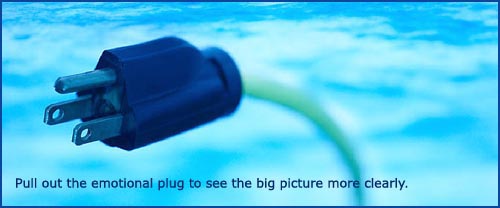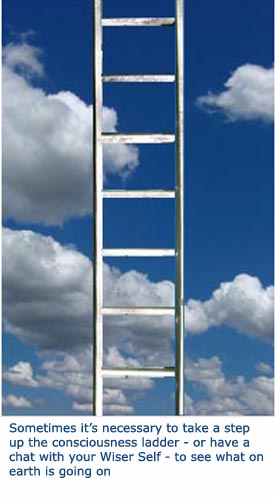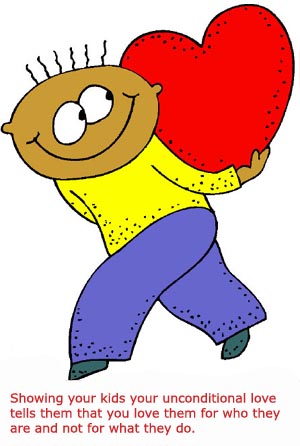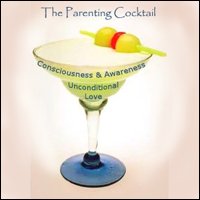
Good Parenting Skills for the Conscious, Open-Minded Parent!
• You want to learn good parenting skills to develop a deep, meaningful relationship with your child?
• Great!
• Then please, allow me to share a little secret with you: Good parenting does not start with how your kid behaves or how you think your kid should behave!
• No, it all starts with finding out what your kid needs!
• The starting point in parenting is being conscious of what your kid needs on an overall level and then making some conscious decisions about how to meet those needs.
• When you've done that - found out what your kid really needs and made a conscious decision as to how to meet the need - you will find parenting much easier, much more natural and deeply pleasurable.
• Okay, confused by my abstract ramble? Sorry, it's my weakness!
• In this article I'll present you with 9 powerful
parenting skills for conscious, peace loving parents.
• But first, let me explain this powerful parenting theory in terms of an example from my own life!
Always Have an Open Emergency Hotline
to Your Wiser Self

RIIING .... RIIING ...
My Wiser Self answers (in a nice, melodious service-orientated voice):
"Your Wiser Self, here: Want advice? Don't hesitate to ask twice"!
(Yes, my Wiser Self does have a quite cheesy slogan. By the way, my Wiser Self is another word for the part of me that sees the bigger perspective on life. You could also call my Wiser Self my gut feeling or my instinct or intuition!)
Positive Parenting Ally (me), (in a slightly stressed voice):
"Hi, my Wiser Self, it's me again!
Yes, I know, I called you less than an hour ago, but now I need some bigger perspective parenting advice again."
My Wiser Self (in a reassuring voice):
"That's okay, you can call me anytime you like. That's why I'm here."
Positive Parenting Ally (relief is already showing in her voice):
"Thanks, I really appreciate it!

Listen, a few days ago I found a tick in my son's belly button.
I removed it quickly with a pair of tweezers but soon afterwards when I helped him take down his pants when he wanted to go to the toilet, I noticed a large red blot on his thighs.
Afraid of borrelia or lime disease (a nasty bacterial infection that can be transferred by infected ticks and which can cause serious neurological damage if left untreated), I called the doctor immediately and he agreed to see us, ASAP, and we got some penicillin.
Now, so far so good!
However, my almost three-year-old son needs to drink the penicillin 3 times a day. The taste is horrible, so I mix it with juice.
However, he doesn't always want to drink it or finish it.
You know, it's really important that he drinks it, but as he doesn't really understand the importance of it how do I make him drink it?"
"What do I do?"
"I have the penicillin right here in my hand, but he won't drink it!
He objects by saying: "It's full of mud!" (A term of utter disgust he uses every time he doesn't want to do something)
My Wiser Self (in a calm, reassuring voice):
"You did right in calling me.
It's always good to look at the bigger picture when we're confused, stressed and don't really know what to do.
Calling me, your Wiser Self, is like "pulling out the emotional plug" to see more clearly!

"I, your Wiser Self who sees the bigger perspective, always look at 'needs'.
What are the needs, and how can we meet them!
Positive Parenting Ally:
"Okay! How do I do this with my son?"
My Wiser Self:
Well, first of all, we have a very physical need. We need to make a potential very serious illness go away. So he needs to take the medicine, obviously! You're right about that!
But in the process he needs to feel respected and loved. This is an emotional need. Forcing the meds into him does no good and will not make him positively attuned to a similar situation in the future.
I'm sure you know this, but what you want to know is how to combine those two things (taking the meds and doing it respectfully), right?"
Positive Parenting Ally:
"Right! You hit the nail on the head!"
My Wiser Self:
Good, let's proceed then:
First of all, we need to cover the physical need: you need to make a deal with yourself - me, your Wiser Self - that your son will drink this medicine.
You may think this deal with yourself is obvious but if you don't make it consciously perhaps even say it out loud, you may waver in the heat of the moment. Bad thing! We don't want that!"
Positive Parenting Ally:
"Why?"
My Wiser Self:
"Because your clever son will detect the slightest wavering in your will and make use of it. Things will be /become much, much harder!
He won't try to defy you because he's 'naughty' but if he feels you're not really serious about it, honestly, why should he?
You see?"
Positive Parenting Ally:
"I do!"
My Wiser Self:
"Next:
Try in whatever way you can to make the drinking interesting: e.g. making spoons imitate aeroplanes that excitingly fly into his mouth, making him suck through colored straws, helping him build long straws on top of each other, letting him drink it in a new place in the house each time, letting him pour out the juice himself, letting him drink it in a bottle like a little baby ... whatever! Just make it fun!
If that doesn't work - talk to him! Look him in the eyes and give him a really thorough explanation. Be really, really present with him. Show him that this is very important to you. Be honest - even if he doesn't understand everything you say.
For instance, you could say: "Listen, sweetie, Mommy really, really wants you to drink your penicillin juice. Remember the tick in your belly button? That tick gave you red thighs and the medicine will help the redness go away. Mom doesn't like your thighs being red. It's not good. Therefore, it's really important to Mom that you drink it."
Really, don't hold yourself back when explaining - in fact, the more thorough the explanation, the better!
- If that doesn't work, go back to making it a game again. Suggest new interesting ways to drink the penicillin. Again, be convinced that you won't give up until he has drunk it. But also say to yourself that you will treat him with respect, patience and calm in the process.
- If making the drinking into games doesn't work, once again, go back to 'intense presence' and respectfully explain why he has to drink it.
- Continue going to and fro between making it a game and explaining.
- And most importantly: Believe in yourself. Believe that you can do this!
The real challenge here is not your son. No, the challenge here is you persistently sticking to what you know he needs."
Positive Parenting Ally:
"Phew, that sounds challenging, but it does feels right. Thanks, I will try this!"
My Wiser Self:
"I know it may sound like a lot of hard work but when you've consciously decided what you need to do (fulfilling those two needs: physical health and love and respect), it really won't feel that difficult.
It really won't!"
The Result:
And, to my surprise, it worked - even though my son has a strong will and is very far from being mindlessly obedient!
I did have to go back and forth between the game strategy and the explaining strategy, but one of them would always work ... if I gave it time:
My son had to take the medicine three times a day for a terrifying total of 10 days and he did it.
Sometimes he complained a bit, but generally he seemed to understand that this was necessary.
The 9 Good Parenting Skills
1) Getting in Touch with Yourself to Gain Perspective ... Taking That Necessary Step up the Consciousness Ladder!

This is actually pretty much a true conversation I have had with myself.
I've spiced it up somewhat to make it more entertaining and clear, but the essence of the conversation is true.
Now, don't worry, I'm not a schizophrenic.
I have just developed a really good strategy - one of my most important parenting skills - that I use every time something doesn't work.
What do I do?
I try to get in touch with myself. (This is one of the most important of the good parenting skills because it's the necessary foundation of all the other skills.)
When things run high, I try to lift myself mentally 'out' of the concrete situation, take a step up the ladder of consciousness and ask myself, my gut feeling, my instinct, my intuition, my Wiser Self:
"What is needed here on a higher level?"
This is not an easy thing to do, especially if you tend to get emotionally caught up in the situation.
However, with consistent 'training' it will become second nature. It really will! I know it has to me.
Having presented 'getting in touch with yourself' as the most basic premise of good parenting, I will now present you with a list the next 8 most important, good parenting skills and explain this:
"What is needed on a higher level?" a bit further.
2) Being Conscious of What Your Kid Needs and Making an Overall Decision to Meet It!

Once again, an important part of good parenting skills is seeing the big picture and listening to your Wiser Self, your gut, your intuition ... and making some conscious decisions!
In relation to the example of my son, the tick and the penicillin I asked myself: What does my kid need on a long term scale?
- Keeping the long term perspective: Well, it was necessary that he took his medicine. If he didn't, the consequences would simply be too severe! Borrelia and streptococcus bacteria are no joke!
- Prioritize and choose: Next, I made a decision that I wouldn't give up! Even if it would take an hour for me to get him to take it (I think the record was 20 minutes)! Getting him to take the medicine was top priority, even if it meant getting to work late that morning.
- Love and respect - no one gets hurt: And finally but no less important, it was essential to me to treat him with respect and patience in the process.
So what we have here is:
Will and dedication to act on what you "see":
Another Tip to Catch That Elusive Perspective!
I will now give you another example to illustrate my point:
E.g. you're always stressed and tired when picking up your kids from nursery or kindergarten and just the very thought of having to go home to cook while having tired, cranky kids constantly whining by your side, exhausts you.
Okay, then, take a moment and ask yourself (and try to be open to whatever answer comes to you):
"How do I make the end of my day more pleasurable for everybody?"
Perhaps the answer to yourself is: "I need more time to myself!"
You know:
"If Mama Ain't Happy, Ain't Nobody Happy!"
Now, you may not like this answer because you cannot see how this need of 'taking time to yourself' can be met!
But if you take your Wiser Self seriously (and I highly recommend that because your Wiser Self is ... well, wise) I suggest that at least you try to consider alternatives to what you're doing now.
You could play a little mental game by laying out options: perhaps, you could flex time with work, work from home, perhaps you could work less, and take an hour or two for yourself before picking up your kids etc.
Always, keep in mind what is your top priority! (If what you need to make life better for everybody is a bit more time for yourself, THAT should be your top priority, right?)
I know it's not easy because you may feel you'll have to sacrifice something: money, perhaps!
But just try to constantly keep in mind what is most important in the long term.
If you're still in doubt, then do a little imaginative game with yourself:
The Future Fantasy Game!
Imagine 20 years have passed. You're looking back at the situation at hand:
Now, what decision would have given you, your partner (if you have one) and your kids the most rewarding life?
The answer is most often crystal clear!
Why?
Because you've got perspective!
This is a really good technique to see the bigger picture.
I use it from time to time when I'm caught up in something and need a bit of perspective!
That was a long explanation. Now, let's move on to Love!
3) Show Your Love Unconditionally!
we're not going to the beach tomorrow!"
Ouch! A very popular parenting technique that uses a threat / bribe in order to control a child's behavior!
Effective parenting skills are about:
- Stopping the use of threats and bribes in order to try to control your kid's behavior.
- Using the power of
the unconditional positive regard, total acceptance and love of your kid no matter how he or she behaves.
This means embracing your kids even when they are 'bad' or when we face the unpleasant thing of having to say no to them.
This parenting strategy is also called unconditional parenting and for many people this way of thinking is a real challenge because we're so used to over-controlling everything.
I still think this line of thought is challenging but I've tried it, and it works!
Nothing "kills" a tantrum better than unconditional love!

So why do I think not just feeling, but showing unconditional love is one of the most important good parenting skills?
Because if we only tend to only show affectionate love when our kids 'behave' or please us, they may come to think that they have to earn our love.
... That they are not loved for who they are, but for what they do: their obeying us or their successes.
The long term consequences of this might be that our children will work incredibly hard to try to fulfil other people's expectations, thinking that if "I am admired, I am accepted".
What is really going on is a form of love confusion: they may be mistaking the admiration of their accomplishments for the love of their person.
Admiration is instant pleasure, yes, but has nothing to do with love.
Therefore it is unsatisfactory in the long run because the admiration of accomplishments will never last and always needs a new boost and it feels shallow compared to the deep love of your person!
Staying within the zone of total acceptance, let's now move on to number four of the good parenting skills:
4) Celebrate Your Child's Uniqueness!
Without really thinking about it we compare everything all the time: babies, looks, skills etc.
The above quotation reflects some thoughts / questions I had while my son was a baby. As a baby was just very different from what I could see other babies were - he was very socially demanding and intense.
However, fortunately my attitude changed as I realized: This is his personality, his uniqueness, his strengths - I've got to work with him, not against him!
Spiritual parenting skills are about:
- Recognizing that your child is perfect the way he or she is! Every kid is born with a particular personality. Treasure it and work with it rather than against it. Really, it's your kid's gift from nature!
- Throwing whatever expectations you have about "my child should be this or that" out the window! Generalizations are insulting to your kid's uniqueness!
- Supporting and encouraging your child to pursue his or her interest(s). Even when it/they is/are different from what you'd have liked it/them to be!
Seeing and recognizing who your child is my lead to the next subject of good parenting skills:
5) Be Deeply Present and Available
Natural parenting is another word for attachment parenting.
Natural parenting skills are about:
- Living in sync with your kid: bonding and tuning in on an instinctual level in order to know what it is your child needs: e.g. love, touch, understanding, being heard, being seen, getting to choose, feeling respected etc.
- Being deeply present and listening to what it is your child is trying to communicate.
- Listening to your gut about what is right and what is wrong for YOUR child - in other words, read your child rather than some book and be critical about the generalized parenting advice you receive!
Yes, norms of child development and child behavior are powerful and norms are exactly what I'll address in the next section of good parenting skills:
6) Question Your Ideas When They Don't Work

Active parenting skills are about:
- Actively questioning your parenting ideas or strategy: Do my preconceived parenting ideas make total sense?
- Always being willing to give up an idea and adjust your expectations to what your child needs - in my case, for instance: "Am I really that busy right now or do I have 5 minutes to let my 3-year-old son ecstatically explore the mechanical wonder of my bicycle's prop stand going up and down, up and down, up and down ..."
Allowing our kids to live out their own agenda as long as it doesn't conflict with the bigger picture is basic respect, which is what the next section about good parenting skills is about.
7) Show Basic Respect and Bless Yourself with a Truckload of Patience
Often we're busy!
So busy that we sometimes tend to see our own agenda as the only important one and dismiss our kid's wishes as silly and irrelevant because we don't have the time to see what's beneath the wanting to bring a kitchen roll holder along.
Perhaps it has nothing to do with the kitchen roll holder at all, perhaps it has to do with a more basic need.
Parents decide a lot of what's going on, so it's really only natural for a child to want to feel that he or she has some degree of say in what happens, feel the power of decision making or perhaps feel the security in bringing something familiar and safe with him to the nursery.
So, positive parenting skills are about:
- Balancing flexibility with consistency: As much as possible present your kid with a range of choices and allow your kid to make his or her own choices within your overall framework! E.g. (to continue the above example) you need to go, but you allow your kid to e.g. take a small toy car with him.
- Explain the unfortunate consequences of your kid's actions rather than resorting to scolding, yelling or spanking! For instance, "You know, Mom is a sad that you threw her vase on the floor. It's all broken now and I can't put flowers in it anymore. And we have glass all over the floor, which might be dangerous because it's sharp and may go into your foot if you step on it."
- Only say "no" when you really mean it. And if you have to, follow up with an explanation: "No, I'm sorry, you cannot have another vitamin pill today, I simply cannot give you that. It's not good for you. It will make your body unhappy. Perhaps you'll even get a pain in your tummy."
This example leads me directly to a more concrete, physical level of good parenting skills:
8) Install Healthy Habits

Physiologically healthy parenting skills are about:
- Taking your child's health seriously by focusing on eliminating, reducing and avoiding unhealthy elements in your child's everyday life.
- Some of the unhealthy lifestyle elements that may not only have instant but also unfortunate long term consequences are: wrong sugary and fatty nutrition, environmental chemical pollutants and biological contaminants.
In this article about healthy parenting you will get a nicely blended cocktail of research results on how to lead a healthy lifestyle along with my own approach to healthy parenting.
And lastly, another set of good parenting skills:
9) Cutting Yourself Some Slack!
Now that you've read about all these good parenting skills, you might think:
But hey, take it easy!
No one is perfect.
I, myself, am definitely not perfect.
I have many insights and ideas about the ideal good parenting skills, yes, but I 'sin', too - I have made many parenting bloopers just like everybody else.
We ALL do. We're human, after all.
So in a sense, perfect parenting skills are:
- To take what is needed seriously, but cut yourself some slack and have some fun when something doesn't really matter in the big picture! (Remember the 'Future Fantasy Game, the 20 years from now' exercise?)
For instance, allow yourself to:
- Look forward to or even count the minutes to your baby's next nap!
- Look forward to your kid getting just a bit older and "easier"!
- Delight in the thought of trying to persuade your parents to start the potty training phase without diaper at their place instead of in your own home, etc.
To sum up this parenting article about good parenting skills:
- Get in touch with yourself and do whatever you can to meet your kids' need - and take that seriously!
- Forgive yourself for making mistakes and allow yourself to jump over the fence when the fence is 'jumpable' - and take that seriously, too!
- Remember, when you have a good time being a parent, chances are that your kids will have a great time being your kids, too!
Your Positive Parenting Ally,
Birgitte

Want to stay in touch and get the latest news?
Sign up
for my free newsletter
Parent Coaching
- For Inner Peace, Clarity and a Deeper Connection to Your Child
 Being a parent can feel like a double-edged sword. Life with kids may feel like the greatest gift you have ever received, while at the same being hugely challenging, often leaving you confused, stressed and overwhelmed.
Being a parent can feel like a double-edged sword. Life with kids may feel like the greatest gift you have ever received, while at the same being hugely challenging, often leaving you confused, stressed and overwhelmed.
When we feel like this, we've lost touch with ourselves. We can't hear our own inner voice, and it's difficult to know what is 'right' for us and how to act.
I offer in-depth parent coaching to help you regain your balance and get back in touch with yourself. From a place of inner peace and clarity, your will find your own answers which will help you reconnect with your child from a place of unconditional love and acceptance.
Read more about my parent coaching here.
Where Would You Like to Go Next?
 What Makes a Good Parent? A Strong Cocktail of Consciousness and Love: Knowing What You Want for Your Kids and Being Those Qualities Yourself! |
 Effective Parenting Skills Nothing Kills a Tantrum Better than Unconditional Love! |
 Healthy Parenting Insights: Reduce Potential Child Health Problems with a Physiologically Healthy Lifestyle. |
 Learn to Use Parental Intelligence in 5 Simple Steps: Expert guest post by Laurie Hollman Ph.D. - solving bad behavior in children with a conscious self-reflective mindset. |
 Perfect Parenting: My Less-than-Perfect Parenting Oops'es! |
Back to the top of this page about Good Parenting Skills for the Conscious, Open-Minded Parent!
Go to the Positive Parenting Ally Homepage







